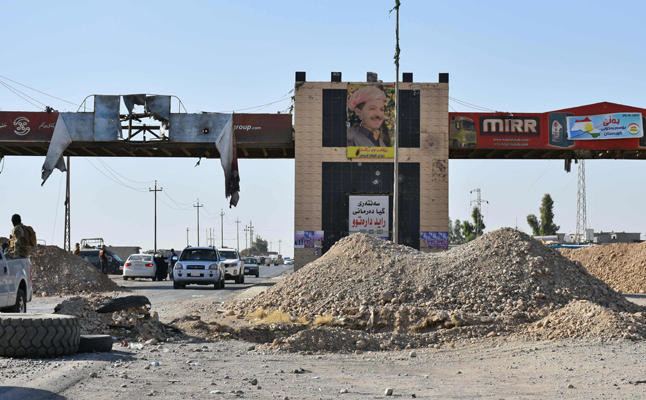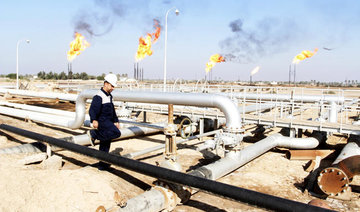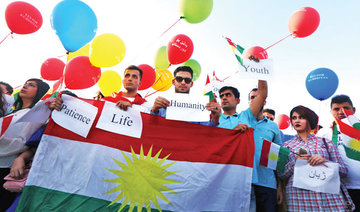BAGHDAD: Baghdad rejected an offer presented by Kurdistan Regional Government (KRG) on Wednesday to freeze the results of September’s referendum, stop all military operations and start an “open” dialogue based on the constitution to defuse tension between the two sides, Iraqi federal officials told Arab News on Wednesday.
KRG had held a controversial referendum on independence, overwhelmingly backed by Kurds late last month. In response, Baghdad launched a huge military campaign last week to regain control over the northern city of Kirkuk, its lucrative oil fields and all the disputed areas gradually seized by the Kurdish authorities.
Iraqi federal forces involved in the military campaign have recaptured most of the disputed areas in the region and are positioned at the Kurdish region's border approved by the 2005 Iraqi constitution which was written in participation with Kurdish leaders.
Armed clashes erupted between the advancing federal troops and the Kurdish forces in several areas on Tuesday. Several federal Iraqi soldiers were killed or wounded, local and federal military sources told Arab News.
The Kurdish offer is seemingly aimed at avoiding further bloodshed. “Clashes between the Iraqi forces and Peshmerga since Oct. 16 to date led to casualties on both sides and could lead to a war of attrition,” the Kurdish statement read. “Therefore, … we offer the following (the proposal) to the government, the Iraqi public and the world”.
KRG proposed to “immediately” cease fire and stop military operations in the region, freeze the results of the referendum conducted in Kurdistan and initiate an open dialogue between the regional government and federal government based on the Iraqi constitution, a statement circulated by KRG on Wednesday said.
Iraqi Prime Minister Haider Al-Abadi has started a regional tour including Turkey and Iran on Wednesday to discuss joint interests of the three countries including the referendum. He has not publically responded to the KRG's offer but said that Baghdad will not stop the military operations to regain control over disputed areas in the northern parts of the country.
“We are continuing to impose federal authority (in the disputed areas), and it is my duty to preserve Iraq's unity and sovereignty and protect its wealth,” Al-Abadi told reporters on Wednesday in a joint press conference held in Turkey with Turkish President Recep Tayyip Erdogan.
Baghdad has imposed many punitive measures on the Kurdish region in the last four weeks. It banned international flights to and from the region, stopped financial transactions with the region, rehabilitated its oil pipelines network which extends from Kirkuk to Ceyhan port in Turkey to bypass Kurdistan and resume oil exports, and filed a formal request to Iran and Turkey to shut down the formal crossings with the region.
Iran has shut down its three formal crossings with the Kurdistan, while Turkey has been coordinating with Baghdad to open a new crossing in preparation to shut down its crossings with the troubled region.
Al-Abadi’s Shiite National Alliance parliamentary bloc, the biggest in the federal Parliament, has said on several occasions that no talks will take place with KRG before they “publically announce the cancellation of the results of the referendum.”
“Freezing the referendum means it will stay like a time bomb which can explode any minute during the negotiations,” Ali Al-Alaq, a National Alliance leader and one of Al-Abadi's advisors told Arab News.
“The (federal) government will not give up its condition. It is irreversible. Any talks should be built on the cancellation of the (results) referendum,” Al-Alaq, said.
On the ground, Baghdad has sent additional troops to be deployed in the newly captured areas in the north. A state of calm veils the region after Tuesday's clashes and both federal troops and Kurdish forces remain in position since Tuesday night, local and federal military officers deployed in the region told Arab News.
In a separate development, the Iraqi joint military operations center has announced the completion of all military preparations to launch an offensive to capture the Iraqi border towns of Al-Qaim and Rawa, the last strongholds of Daesh in the western parts of Iraq. Hundreds of thousands of leaflets were dropped on the two towns on Tuesday instructing civilians to hand over Daesh militants and avoid being near their sites.
“No specific date was chosen to launch the offensive but we have completed all our preparations,” a senior military officer involved in the operation who refused to be named told Arab News.
“We are waiting for the orders, and we don’t think we will wait for long,” the officer, said.
Baghdad rejects Kurdish proposal to freeze referendum results
Baghdad rejects Kurdish proposal to freeze referendum results

UN experts slam Israel’s blatant assault on health rights in Gaza

- Reiterating charges that Israel is committing genocide in Gaza, two independent UN rights experts said they were “horrified” by the raid last Friday on Kamal Adwan, northern Gaza’s last functioning major hospital
- UN special rapporteurs are independent experts appointed by the UN Human Rights Council but do not speak on behalf of the world body
GENEVA: UN experts have denounced Israel’s raid on an embattled hospital in northern Gaza, demanding an end to the “blatant assault” on health rights in the besieged Palestinian territory.
Reiterating charges that Israel is committing genocide in Gaza, two independent UN rights experts said they were “horrified” by the raid last Friday on Kamal Adwan, northern Gaza’s last functioning major hospital.
“For well over a year into the genocide, Israel’s blatant assault on the right to health in Gaza and the rest of the occupied Palestinian territory is plumbing new depths of impunity,” the experts said.
The joint statement was from Francesca Albanese, the independent UN special rapporteur on the rights situation in the Palestinian territories, and Tlaleng Mofokeng, the special rapporteur on the right to health.
FASTFACT
The joint statement was from Francesca Albanese, the independent UN special rapporteur on the rights situation in the Palestinian territories, and Tlaleng Mofokeng, the special rapporteur on the right to health.
Israel’s diplomatic mission in Geneva dismissed the statement as “far removed from the truth,” saying it “completely ignores critical facts and the broader context of Hamas’s exploitation of civilian infrastructure for military purposes.”
The Israeli military has repeatedly accused Hamas of using hospitals as command centers, something Hamas denies.
The military “undertook every effort to protect civilians,” the Israeli mission said, insisting its “actions highlight Israel’s commitment to international law and the protection of civilian infrastructure, even under the most challenging circumstances.”
Israel’s military said it had killed more than 20 suspected militants and detained more than 240, including the hospital’s director, Hossam Abu Safiyeh, describing him as a suspected Hamas militant.
In their statement, Albanese and Mofokeng said they were “gravely concerned” at Safiyeh’s detention and demanded his “immediate release.”
“Yet another doctor to be harassed, kidnapped, and arbitrarily detained by the occupation forces,” they said.
“This is part of a pattern by Israel to continuously bombard, destroy, and fully annihilate the realization of the right to health in Gaza.”
UN special rapporteurs are independent experts appointed by the UN Human Rights Council but do not speak on behalf of the world body.
The experts also highlighted “disturbing reports” that Israeli forces had allegedly carried out extrajudicial executions of some people near the hospitals, including a Palestinian man reportedly holding a white flag.
They pointed to figures provided by the Health Ministry in Gaza indicating that at least 1,057 Palestinian health and medical professionals have been killed since the war erupted following the Palestinian group’s Oct. 7, 2023 attack inside Israel.
The World Health Organization has repeatedly denounced the high number of attacks on health care staff and facilities in the war: 1,273 attacks on health care in Gaza and the West Bank have been recorded since the start of the war.
WHO chief Tedros Adhanom Ghebreyesus warned on X that the pace of desperately needed medical evacuations out of Gaza was “excruciatingly slow.”
“Only 5,383 patients have been evacuated with support from WHO since October 2023, of which only 436 since the Rafah crossing was closed” last May, he said.
He said more than 12,000 people were awaiting medical evacuation from Gaza.
“At this rate, it would take 5-10 years to evacuate all these critically ill patients, including thousands of children,” he added.
“In the meantime, their conditions get worse and some die.”
Lebanon’s PM discusses with Syria’s de facto ruler relations between two countries

Sharaa also affirmed that Syrian authorities took the necessary measures to restore calm on the border between the two countries, the post on X said.
Syrian foreign minister to visit Qatar, UAE and Jordan this week

CAIRO: Syrian Foreign Minister Asaad Hassan Al-Shibani said in a statement posted on X on Friday that he will visit Qatar, the UAE and Jordan this week to “support stability, security, economic recovery and build distinguished partnerships.”
Lebanese army unit clashes with Syrian gunmen at illegal border crossing

- Interior minister defends additional security measures at airport and land crossing points
BEIRUT: A Lebanese army unit clashed with a group of armed Syrian nationals at the border on Friday as the soldiers attempted to “close an illegal crossing” in the Maarboun-Baalbek area of eastern Lebanon.
The Syrians were trying to forcibly reopen the crossing with a bulldozer, the army said. Soldiers fired warning shots into the air and Syrians responded by returning fire.
The “armed Syrians fired at the Lebanese soldiers, injuring one and sparking a clash between both sides,” the army command added. “Artillery shells were used” and other Lebanese army units in the area also responded with strict military measures, it added.
Subsequently, “reinforcements from the army’s mobile regiment arrived in the area, following the retreat of the armed Syrians, some of whom sustained injuries,” and the illegal crossing remained closed.
Maarboun is a town in Baalbek-Hermel governorate, and a natural crossing point between the two countries. However it is an illegal crossing mainly used by smugglers and human traffickers. The surrounding area is known to be pro-Hezbollah.
The incident at the illegal crossing coincided with the actions of Syrian authorities on Friday morning that prevented hundreds of Lebanese from crossing the border between Masnaa in Lebanon and Jdeidet Yabous in Syria.
The Syrians suddenly imposed new conditions on Lebanese visitors, including requirements that they have a hotel reservation and at least $2,000 in cash. People visiting Syria for surgery or other medical care must now have proof of an appointment and a Syrian sponsor who can confirm their identity. A valid residence permit for the stay in Syria is also required. Lebanese authorities imposed similar rules on Syrians entering Lebanon after the civil war in Syria began more than a decade ago.
Buses carrying Lebanese passengers who intended to visit Syria were forced turn back at the border as a result of the new Syrian rules.
Lebanon’s General Security Directorate decided to “prohibit any Lebanese from entering Syria through illegal crossings between both countries in Bekaa and the north, pending clarity during this stage,” a source from the agency said.
After the fall of President Bashar Assad and his regime in Syria in early December, the directorate held two meetings with officials from the new Syrian administration to discuss the regulation of movement between the two countries.
Though media delegations, politicians and civilians have crossed into Syria in recent days, Lebanese authorities have tightened security at land crossings, following similar actions at Rafic Hariri International Airport in Beirut.
Normal operations at the airport resumed on Friday after an incident on Thursday night involving an aircraft belonging to Iranian airline Mahan Air. Airport security decided to conduct a thorough inspection of all passengers when the plane landed, including luggage belonging to diplomats on board. The diplomats protested and chose instead to leave their luggage at the airport. It was taken to a storage facility for inspection the following day using scanners.
Footage circulated on social media apparently showing young men on motorcycles heading to the airport to protest against the measures. It was believed the heightened security was motivated by concerns that passengers might be carrying money for delivery to Hezbollah. A second Iranian plane that landed on Friday faced similar security measures.
Lebanon’s interior minister, Bassam Mawlawi, described the move as a routine procedure and added: “What the airport security is doing aims to protect Lebanon and the Lebanese people. We are enforcing the law, protecting the airport and safeguarding all of Lebanon because it cannot withstand any new aggression.”
The decision covered the inspection of all luggage, he said, including that carried by diplomats.
The heightened measures drew criticism from the vice president of the Supreme Islamic Shiite Council, Sheikh Ali Al-Khatib. During his Friday sermon, he called on the interior minister “to demonstrate his heroism against the enemy, not against those who made sacrifices to defend Lebanon’s sovereignty.”
Also on Friday, US Maj. Gen. Jasper Jeffers, head of the international committee monitoring the implementation of the ceasefire agreement between the Israeli army and Hezbollah, toured Khiam, where the Lebanese army was deployed after the withdrawal of the Israeli forces. He was accompanied by Brig. Gen. Tony Faris, commander of the Lebanese army’s 7th Brigade.
Their visit came as Israel continued to face criticism for violating Lebanese sovereignty, including reconnaissance flights over southern Lebanon, extending as far as the southern suburbs of Beirut. Israeli forces were also accused of demolishing houses and roads in Dhayra and Jebbayn, and there were renewed warnings to residents of southern Lebanon not to return to homes in border areas until further notice.
There was a heavy presence of UN Interim Force in Lebanon forces along the Bayada-Naqoura road. The Lebanese army has placed concrete barriers on the road to Naqoura, preventing people other than UNIFIL personnel from entering. The UN force’s headquarters is located there.
The Lebanese army said it was surveying military remnants in Naqoura following the withdrawal of Israeli forces from the town on Thursday. When this task is complete, Lebanese forces will be redeployed to the area, it added.
Hamas wants Gaza ceasefire deal as soon as possible, senior official says

- Mediators Qatar, Egypt and the US have been engaged in months of back-and-forth talks between Israel and Hamas
CAIRO: Hamas said a new round of indirect talks on a Gaza ceasefire resumed in Qatar’s Doha on Friday, stressing the group’s seriousness in seeking to reach a deal as soon as possible, senior Hamas official Basem Naim said.
The new talks will focus on agreeing on a permanent ceasefire and the withdrawal of Israeli forces, he added.
Mediators Qatar, Egypt and the US have been engaged in months of back-and-forth talks between Israel and Hamas that have failed to end more than a year of devastating conflict in Gaza.
A key obstacle to a deal has been Israel’s reluctance to agree to a lasting ceasefire.
On Thursday, Prime Minister Benjamin Netanyahu’s office said he had authorized Israeli negotiators to continue talks in Doha.
In December, Qatar expressed optimism that “momentum” was returning to the talks following Donald Trump’s election victory in the United States.
But a war of words then broke out with Hamas accusing Israel of setting “new conditions” while Israel accused Hamas of creating “new obstacles” to a deal.
In its Friday statement, Hamas said it reaffirmed its “seriousness, positivity and commitment to reaching an agreement as soon as possible that meets the aspirations and goals of our steadfast and resilient people.


















